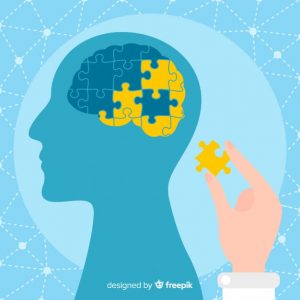Although the study of mental processes and behavior can be traced back to ancient Greece, Psychology emerged as a separate field over the 19th century. Many philosophers strived to answer the questions related to the human mind, such as How do we make sense of the world around us? What is the relationship between the mind and the body? And so on. Earlier philosophers tried to answer some of these questions through various methods.

René Descartes (1596 – 1650), a French polymath attempted to answer various questions related to the mind and the body through logic and careful reasoning. This approach was also known as rationalism. Descartes was a dualist; he believed that the mind and the body are separate entities and interact through the pineal gland, located within the brain. On the contrary, other philosophers have a different notion. They believed that the mind influences the body and vice versa.
Similarly, other philosophers have different ideas. They believe that the human mind could not be merely studied through logic and reasoning and also requires careful observation (also called an empirical approach). For example, British philosopher John Locke (1632 – 1704) believed that the children were born into this world with an empty mind also called tabula rasa in Latin (which means blank slate).
Then the physiologists stepped in. They have been studying the nervous system and sensations applying scientific methods. Johannes Peter Müller (1801 – 1858), a German physiologist examined how the electrical signals were conducted by nerves within the body. Similarly, Hermann Von Helmholtz showed how the eyes and ears receive and interpret sensations from the surrounding. Gustav Fechner demonstrated the relationship between the psychic and the physical world.
In 1879 A.D Wilhelm Wundt (who is often described as the father of psychology) established the first laboratory of psychology at the University of Leipzig, Germany. Similarly, Alexander Bain, a Scottish philosopher founded the first journal devoted to Psychology, Mind in 1876. He also wrote many books on psychology and taught many students who went on to make significant contributions to psychology.
Similarly, G. Stanley Hall (1844-1924), one Wundt’s student founded the first laboratory of psychology in America at Johns Hopkins University in 1883. He also helped to start the American Psychological Association in 1892 (which is now the largest umbrella organization of psychologists in the United States) and became its first president. Soon many universities in the U.S went on to establish psychology departments and laboratories.
Different psychologists hold different views about the nature of mind and the ways to study it. As the leaders and their students adopted their ideas, various schools of psychology were formed.
Structuralism
The theory of structuralism formally laid the foundation of psychology. This first school of psychology was pioneered by Wilhelm Wundt and his student Edward Titchener. Structuralists aimed to find the basic units, or elements, which make up the mind. Structuralists thought that psychology should focus on analyzing the contents of consciousness to determine its essential components and relationships between them. The method used by the structuralists to discover these elementary units of mind was introspection. In this method, the individuals report in detail on their conscious experiences in response to specific stimuli such as sounds, optical illusions, etc. One of the key contributions of Gestalt psychology is in the areas of human perception.
Gestalt Psychology
Gestalt psychology was founded and pioneered in Germany by Max Wertheimer (1880 – 1943), Kurt Koffka (1886 – 1941), and Wolfgang Kohler (1887 – 1967). According to the Gestalt psychologists, the mind is best understood in terms of the ways elements are organized. The name ‘Gestalt Psychology’ was derived from the German word Gestalt that means ‘pattern’, ‘form’, or ‘configuration’. Rather than looking for the individual parts, Gestaltists studied how people consider individual elements together as a unit or wholes. “The whole is different from the sum of its parts,” this is what they believe.
Functionalism
The idea of structuralists was soon rejected by William James and other psychologists. They felt that the study of psychology should focus on what the mind does rather than the structure. This school of psychology was highly influenced by Darwin’s theory of evolution. Functionalists were interested in how the stream of conscious – the flow of thoughts in mind enables an individual to adjust to a changing environment. The functionalists such as John Dewey (1873 – 1954), James R. Angell (1869 – 1949), and Harvey Carr (1873 – 1954) were focused on which various cognitive functioning of the brain such as learning, motivation, memory, thinking, problem-solving help people and animals adapt to their environment.
Behaviorism
This school of psychology was started by John B. Watson (1879 – 1958) who spent many years at Johns Hopkins University. Watson rejected the earlier ideas and insisted that psychology should focus on the study of the observable behavior of people and animals. Behaviorism focused on three key areas. One was that it emphasizes conditioned responses. Secondly, behaviorism focuses on learned behavior. It denies the existence of inborn or innate behavioral tendencies/abilities. Third, was its focus on animal behavior. Watson also argued that as the internal mental states should not be the part of psychology as they could not be studied. For instance, we can not guess about the internal states of mind, such as thinking.
Psychoanalysis
Psychoanalysis is not a formal school of psychology, but it had a significant influence on many psychologists. The theory of psychoanalysis was formulated by Sigmund Freud (1856 – 1938) who was a neurologist at Vienna. According to Freud, much of what we do and think is motivated by inner forces which we have little awareness or control. In other words, it is the expression of the unconscious drives that show up in thoughts and behavior. The term unconscious is the central idea behind psychoanalysis.







